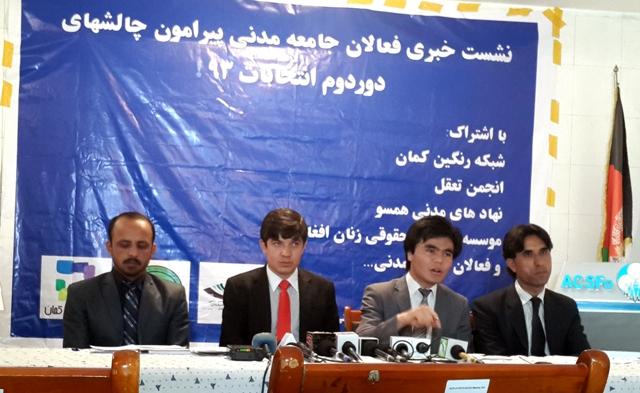KABUL (TEFA) on Thursday said alleged fraud in the second round of voting be investigated to the satisfaction of both presidential hopefuls. It asked the candidates to resolve their differences about the results.
TEFA chief Muhammad Naeem Ayubzada told a press conference in Kabul the voter turnout in the June 14 runoff election had been lower than the first round. The foundation’s findings indicated that anomalies were committed at 218 polling stations in 16 provinces.
Without naming the provinces, he alleged voters cast their ballots at 18 polling sites in seven provinces without their index fingers being inked. Multiple voting took place at more than 337 polling centers in 19 provinces, he revealed.
Armed clashes between supporters of the two candidates happened at 14 polling centers in seven provinces. Similarly, people under the age 18 cast ballots at 581 polling centers in 27 provinces.
According to the TEFA chief, 512 polling centers in 25 provinces ran out of ballot papers and men voted for women at 213 centers in 17 provinces.
Ayubzada added security incidents in the second round increased. A rocket attack took place in Kabul, with bomb explosions and militant attacks reported from different parts of the country. “Public awareness also increased and people voted despite threats,”
About Abdullah’s criticism of IEC, he said that any candidate’s lack of confidence in the election bodies would fuel serious concerns among the people and damage the democratic process.
“A deadlock would trigger an election crisis — a huge blow to democracy in Afghanistan and achievements of the past decade,” he observed.
TEFA member Sadiqullah Tawhidi presented some suggestions for reforming the election process. His suggestion included supervision of the vote count until the results were announced, addressing complaints at public hearings and invalidating fraudulent votes.
He also called for coordination between IEC and IECC for greater transparency in the election result, providing facilities for observers at vote-counting centers and shortening the tallying process.
Meanwhile, Rangin Kaman Civil Network chief Nazifullah Nazif told journalists that people’s concerns at the issue of electoral irregularities were rising with each passing day. He warned the problem could lead the country to instability.
Members of Taqool Legal Association, Hamso Civil Society and legal support organisations for women were also present on the occasion.
“Elections have turned into a serious challenge. The election bodies, government and candidates will be held responsible if the country plunged into a crisis,” he added.
Nazif suggested the presidential candidates should resolve their differences and reach an understanding to address public concerns.
Hamso Civil Society representative Abbas Faraso asked both runners to seek legal ways of resolving their complaints to promote rule of law and national-building efforts.
mm/mds/mud







GET IN TOUCH
NEWSLETTER
SUGGEST A STORY
PAJHWOK MOBILE APP